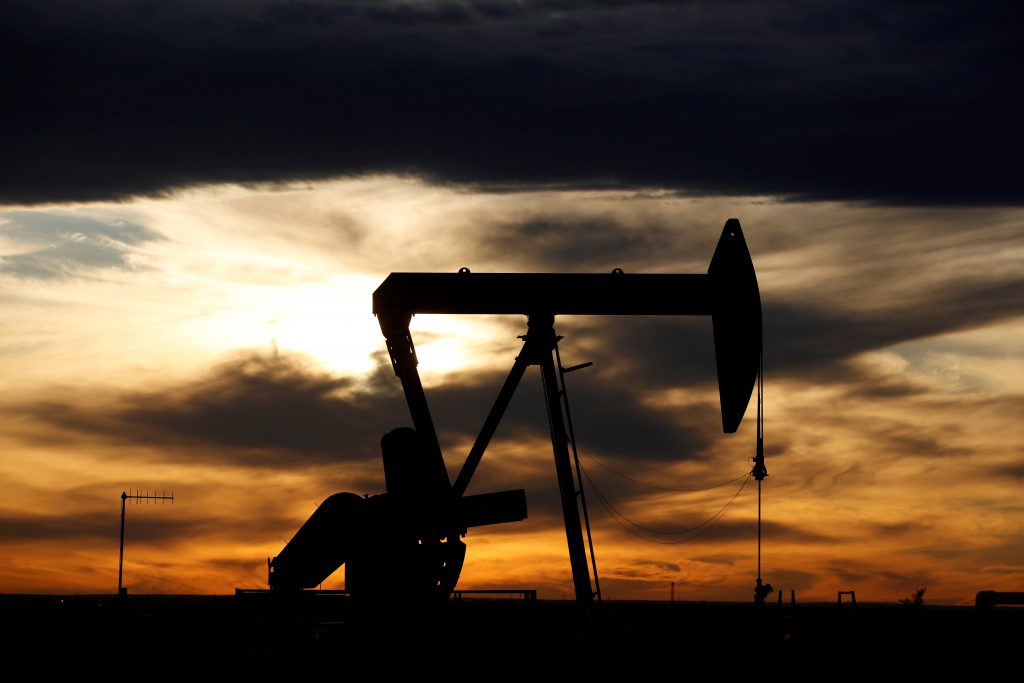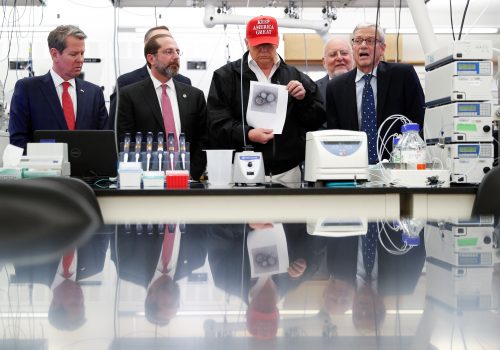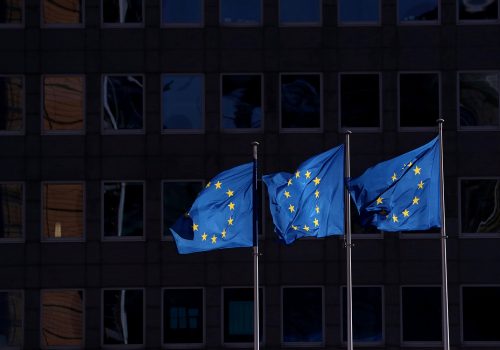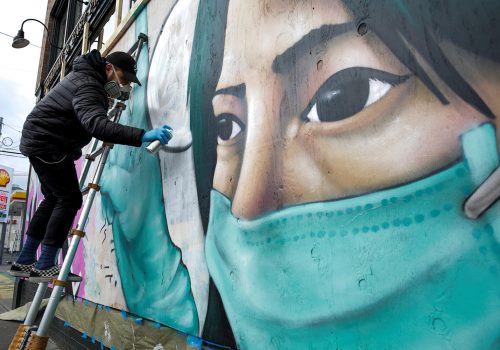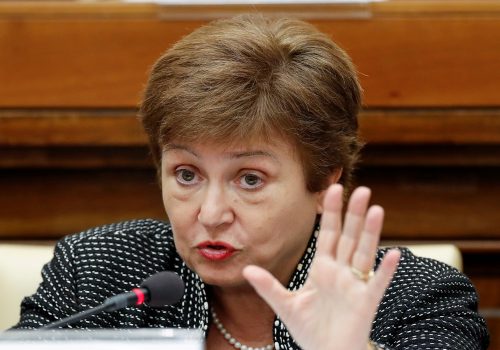Donald Trump has called himself a “war-time” president, referring to his campaign as commander-in-chief against coronavirus. In past days, he has taken on a new role as negotiator-in-chief trying to end the oil-price war that is endangering U.S. shale producers and hundreds of thousands of jobs.
This week’s result is an emergency, virtual meeting of OPEC leaders with Russia, Canada and Mexico. It was delayed from Monday until Thursday due to an ongoing Saudi-Moscow dispute about how to address the biggest collapse in global demand and prices since the discovery of the world’s first viable oil well in the mid-19th century.
What’s decided at that meeting will say much about the limits to the leverage President Trump wields as the world’s leading oil and gas producer and with two authoritarian leaders in whom he’s invested so much – Russian President Vladimir Putin and Saudi Crown Prince Mohammed bin Salman.
It was the bitter Riyadh-Moscow battle for market share since early March that had prompted a record two-thirds decline in oil prices to $21.65 per barrel, the lowest point since 2002. Yet Trump’s intervention with both men last week, as described to CNBC’s Joe Kiernan, had seemed to pay off.
Trump said that he expected OPEC and the Russians to announce cuts of as much as 15 million barrels off the global total of 100 million. Markets rallied on Thursday and Friday to their biggest one-week gains ever of nearly 37% – only for investors to wake up this weekend to continued Saudi-Russian sniping and the possibility of a renewed price plunge this week.
What markets are missing in these radical swings is that a greater power than these three alpha males – Trump, Putin and MBS – is at work. They face the inescapable force of COVID-19, which for weeks and perhaps months to come will depress the global economy. April demand is thought to have dropped by more than 20 million barrels and perhaps by as much as 30 million – a far greater sum than any cuts producers may announce this week.
Never has the world experienced such a double whammy of demand shock and supply surge. In the end, it could be limits to global storage more than Trumpian intervention that shut off the spigots.
Get the Inflection Points newsletter
Subscribe to Frederick Kempe’s weekly Inflection Points column, which focuses on the global challenges facing the United States and how to best address them.
Writing in Foreign Affairs, Pulitzer Prize-winning author and energy expert Daniel Yergin calculates that “virtually every available gallon of storage space in the world will be full by late April or early May. When that happens, two things will result: prices will plummet and producers will shut down wells because they cannot dispose of the oil.”
However this remarkable chapter in energy history ends, it’s revealing to study what was behind President Trump’s dramatic course reversal on how to approach the record decline of oil prices, which he on March 31st called “the greatest tax cut ever given” the American consumer.
Some factors behind this U-turn were the persistent influence of 2020 electoral politics, the little-known role of former Energy Secretary Rick Perry and a threat to a Saudi-owned Texas refinery, and the lobbying power of the American energy industry (and some 2.5 million jobs it’s estimated to create).
President Trump began to reverse course when confronted by aggressive lobbying by American oil companies and shale producers that he should apply more pressure on his Russian and Saudi friends to cut their production. His concerns grew further when confronted by the potential impact of energy company bankruptcies on U.S. employment and his own November electoral chances, particularly in Texas.
Most intriguing, as the Financial Times reported Friday, a key individual behind the President’s apparent turn was former Texas Governor Rick Perry, who was Trump’s energy secretary until the end of last year.
Though Perry had established good relations with his Saudi partners, he advocated that the U.S. block Saudi crude from reaching North America’s biggest refinery in Port Arthur, Texas, which is fully owned by the Saudis.
Speaking to Fox News on March 31st , Perry said he would advise Trump to tell U.S.-based refineries to use only American-produced crude for the next two to three months. That would send a “clear message that we’re just not going to let foreign oil flow in here,” Perry said.
Shale producers had been lobbying the White House at the same time to suspend U.S. military aid to Saudi Arabia and impose further sanctions on Russian energy until the new countries cut their production. They also argued that the President should consider lifting some existing Russian sanctions should Putin play ball and back off his campaign to put them out of business.
However, it appears to have been the threat to the Saudi refinery and to its overall relations with the United States that got Riyadh’s attention. When confronted by the possibility that Putin and the Saudi crown prince might not deliver on their production cuts this weekend, Trump upped the ante on Saturday and said he would impose tariffs on oil imports to “protect” U.S. energy workers from an oil price crash.
This would be a win for the smaller and mid-sized producers versus the United States’ oil majors, who have opposed punitive tariffs.
At the same time, President Trump may need to determine how he can deliver on Saudi demands for U.S. production cuts, lacking any direct ability to influence American producers. The two likeliest options would be a voluntary decision of the Railroad Commission of Texas, which regulates the state’s oil and gas industry, or a shutdown of Gulf of Mexico platforms and their 1.8 million barrels daily, using the threat of coronavirus to their workers as the reasoning.
The uncomfortable fact for President Trump is that despite his long-standing criticism of the OPEC and his support for free energy markets, he needs the cartel’s market intervention to keep shale producers afloat.
President Trump doesn’t have good options. He lacks easy leverage over the players, domestic and international, and he’s got even less control over the COVID —19 economic hit.
In the end, it is more likely that a U.S. government bailout will save the industry, rather than a global market intervention.
This article originally appeared on CNBC.com
Frederick Kempe is president and chief executive officer of the Atlantic Council. You can follow him on Twitter @FredKempe.
MUST-READS FROM A WORLD IN TRANSITION
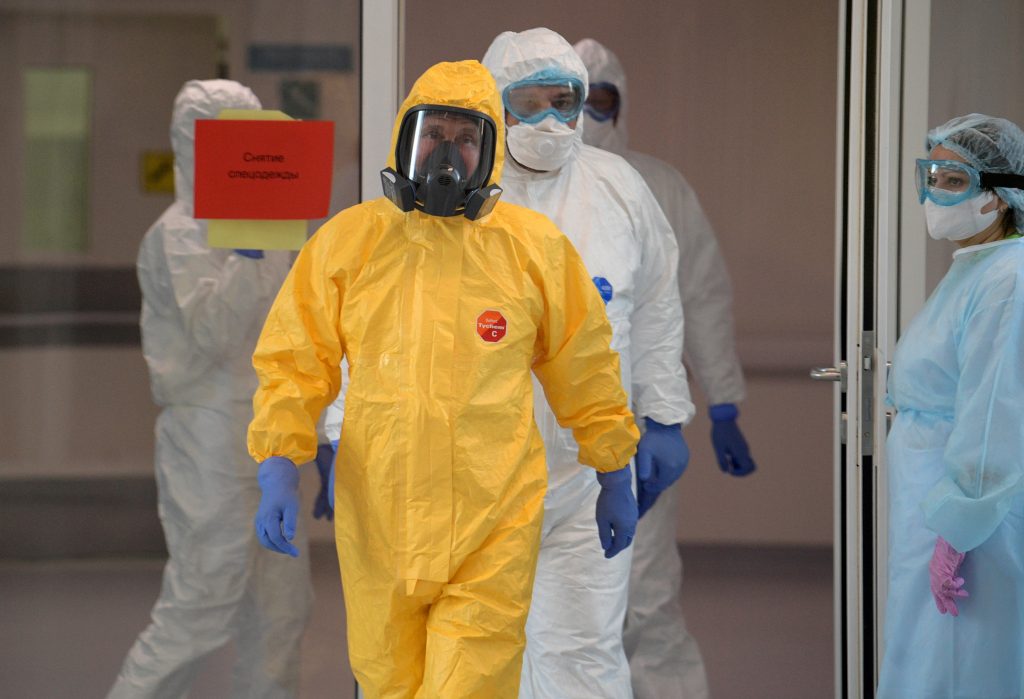
This week’s must-read comes from Henry Kissinger, who at age 96 delivers the most powerful mission statement for the Atlantic Council and warning for the United States simultaneously.
“The historic challenge for leaders is to manage the crisis while building the future,” he concludes. “Failure could set the world on fire.”
Also, don’t miss former FT editor Lionel Barber’s reflections on our changing world in the UK Spectator, Dan Yergin’s brilliant guide to the oil price war in Foreign Affairs, and Ana Palacio’s concerns about COVID-19 and democracy in Project Syndicate.
If you don’t think saving lives and the economy can be done at the same time, read Rajiv Shah and Paul Romer’s novel look at a different sort of testing from the Wall Street Journal.
#1. KISSINGER’S MUST-READ WARNING
The Coronavirus Pandemic Will Forever Alter the World Order
Henry A. Kissinger / WALL STREET JOURNAL
Speaking with a friend this week, I said that the voice we most needed to hear right now was that of Henry Kissinger. Then in the Saturday Wall Street Journal I found one of the most significant statements he’s made in his 96 years.
Read every word, starting with his time as a young infantryman during the Battle of the Bulge, but the two most important paragraphs are the following:
“No country, not even the United States, can in a purely national effort overcome the virus. Addressing the necessities of the moment must ultimately be coupled with a global collaborative vision and program. If we cannot do both in tandem, we will face the worst of each.”
Building off this, he concludes with a warning:
“We went on from the Battle of the Bulge into a world of growing prosperity and enhanced human dignity. Now, we live an epochal period. The historic challenge for leaders is to manage the crisis while building the future. Failure could set the world on fire.” Read More →
#2. NOTHING WILL REMAIN THE SAME
How will the world be changed by the war against coronavirus?
Lionel Barber / THE SPECTATOR
It was good to see my friend of many years, the former FT editor Lionel Barber, reflecting in the UK’s Spectator on how “the world as we have known it for the past 40 years has come to a stop.”
He raises the provocative question: “Will March 2020 be remembered like the Great Crash of 1929 or the end of World War Two in 1945, events which catalyzed radical changes in the way economies and societies were organized across the world.”
He considers the potential answers from the future of globalization and the European Union to the potential impact on America’s election and emerging markets. What’s clear: nothing will remain the same. Read More →
#3. “A MARKET OVERWHELMED”
The Oil Collapse
Daniel Yergin / FOREIGN AFFAIRS
Emerging-Market Petrostates Are About to Melt Down
Amy Myers Jaffe / FOREIGN AFFAIRS
If Henry Kissinger is the person to whom one turns on threats to the global order, then Dan Yergin is my author of choice in navigating the energy world.
“The global oil market has never in history collapsed as precipitously as it has right now,” he writes in Foreign Affairs, brilliantly guiding the reader through the events of the past weeks that have landed us there.
“With much of the global economy at a standstill, the oil crisis is going to get worse in the weeks ahead,” he writes. “Some of that might be the result of the coronavirus infecting and disrupting operations in different parts of the world. Some if it might be the result of decisions by countries despite an era of fractious global politics. But the bulk of the decline will be the result of a market overwhelmed by the sheer fury of the coronavirus and the shutdown of the world economy.” Read More →
Also, don’t miss Amy Myers Jaffe, also in Foreign Affairs, dissecting the threat to emerging-market petrostates. Keep your eye on Ecuador, Iraq, Nigeria, and Mexico – and oil-linked debt woes that “could explode across the Middle East, Latin America, and Africa in 2020.” Read More →
#4. THE THREAT TO DEMOCRACY
Can Liberal Democracy Survive COVID-19?
Ana Palacio / PROJECT SYNDICATE
Former Spanish Foreign Minister Ana Palacio, also an Atlantic Council board member, contributes to the urgently needed conversation on how to defend democracy while conquering COVID-19.
“….the coming economic crisis will deepen doubts about western liberalism and weaken its position in the global contest of ideas that is currently underway,” she writes. “It is thus imperative that Western leaders not only limit the spread of COVID-19, but also foster social cohesion, devise a credible path back toward growth and normalcy, and reinvigorate the values and institutions that underpin liberal democratic societies.” Read More →
#5. NEW THINKING ON TESTING
Testing is Our Way Out
Paul Romer and Rajiv Shah / WALL STREET JOURNAL
Nobel Prize-winning economist Paul Romer and Rockefeller Foundation President Rajiv Shah suggest a novel approach to COVID-19 testing that could manage the virus in a more targeted manner and thus avoid a depression.
“Two types of testing will be essential,” they write. “The first test, which relies on a technology known as the polymerase chain reaction, or PCR, can detect the virus even before a person has symptoms. It is the best way to identify who is infected. The second test looks not for the virus but for the antibodies that the immune system produces to fight it…”
The authors argue that the two tests together will give policymakers the data to make smarter, faster decisions and better target efforts. Read More →
(They’ll speak on Wednesday at 11 am at an Atlantic Council virtual event, explaining their approach.)
PERSON OF THE WEEK
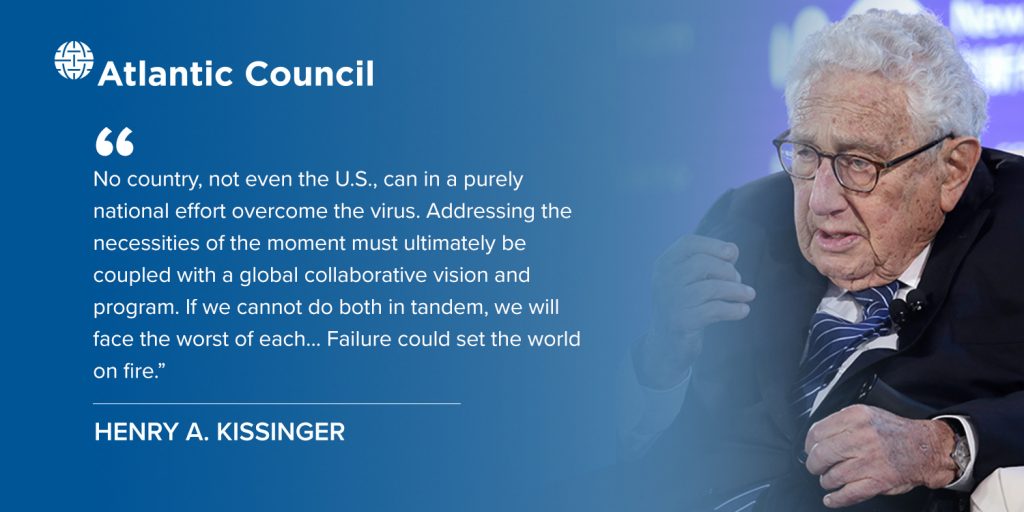
ATLANTIC COUNCIL TOP READS
Image: FILE PHOTO: The sun sets behind a crude oil pump jack on a drill pad in the Permian Basin in Loving County, Texas, U.S. November 24, 2019. Picture taken November 24, 2019. REUTERS/Angus Mordant/File Photo
